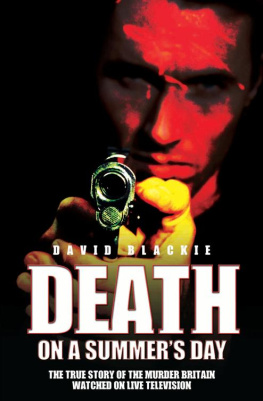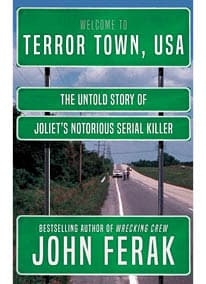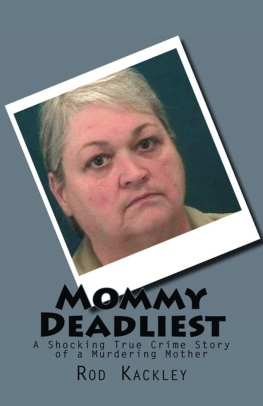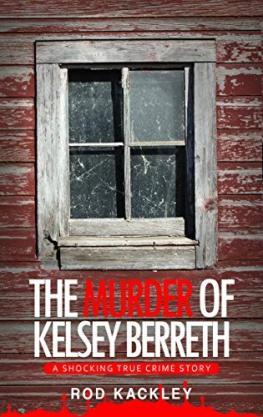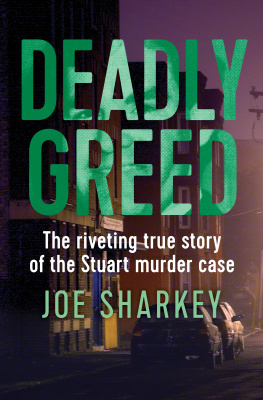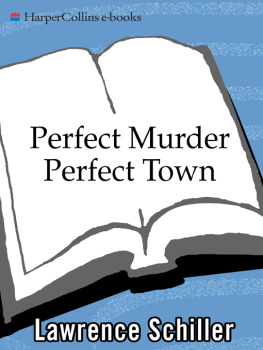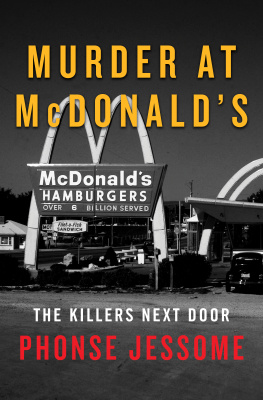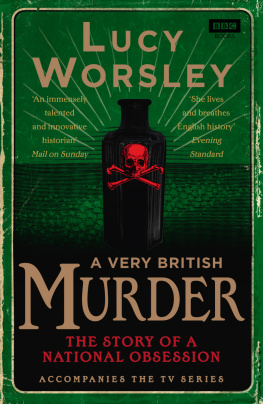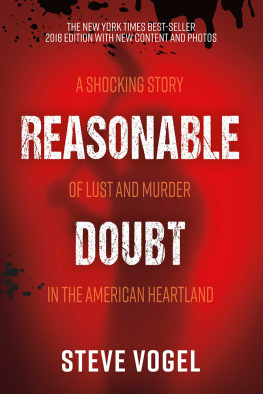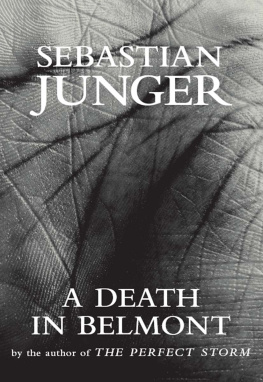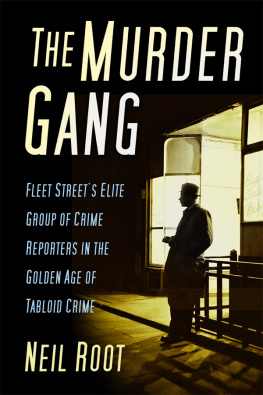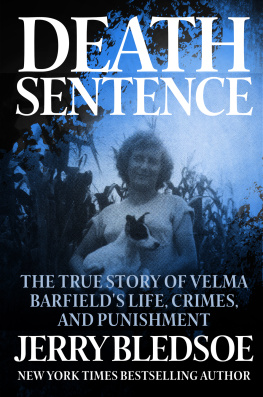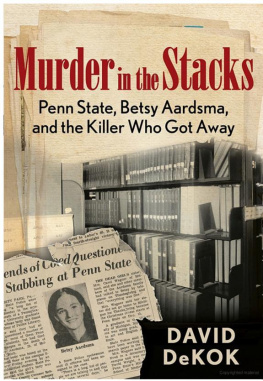I first formed the idea to write this book after leaving the police service. I thought long and hard about my motives for doing so, and it is accurate to say that these have changed considerably during the exercise. While conducting research for this book I interviewed many people, some of whom have had their lives turned upside-down by the events described herein; for some, the gunman will chase them through their dreams. Then there were those who, for their own individual reasons, refused to speak to me at all. To others, it felt as if I was almost their father confessor, so eager were they to share their experiences. But of all these, Dryden was the one person, the enigma, whom I felt that I had to see.
Some of the people mentioned within this book have since died, but none so tragically as Harry Collinson, who perished in an unnecessary confrontation between two human beings that was to have such dire consequences for so many people: children deprived of a father, a sister deprived of a brother. Many others will have suffered in many ways. This book is not intended to be an accounting, a witch hunt, but rather a tale from which salutary lessons must be learned to ensure that such stupidity should never be repeated. Nonetheless, I regretfully remain assured that the fallibility of man will allow a senseless imitation of such waste.
I could not have completed this work without the help and encouragement of others. My purpose in writing this book was to create a better understanding not only of what happened but also of its effects on others, myself included, and I hope that those not directly involved in the history of events portrayed here whether known, unknown or still dear to me but nonetheless touched by these events may also understand. I must therefore pay tribute to the support that was given to me by all those who have contributed to the book, especially my friend and confidant Ian Wriglesworth; to the assistance of a truly remarkable police officer, Arthur Proud; and to the unstinting encouragement and total trust of my dear wife, Carol, whose support was unwavering, even when times were bad.
B one-tired a strange expression, but one I now understood exactly. I was so mentally and physically exhausted that my bones ached.
Bone-tired.
I held the key between forefinger and thumb, the last rays of the still-warm spring sun glinting on the dull brass. Pausing for a moment, my hand shaking slightly, and trying hard to focus, I gathered myself before crossing yet another boundary. I really had crossed enough bloody boundaries that day, not to mention ditches and fields. Trying to make as little noise as possible, I slid the key carefully into the lock and heard the tumblers fall as the door eased open. I thought that my day was finished; I didnt, couldnt imagine what was yet to come.
I closed the door softly behind me, placed my heavy kit bag, which had travelled everywhere with me, gratefully on the floor and opened the door into the living room. I was totally exhausted by the days events but, before I could even register the image in front of me, I was assaulted with a barrage of noise from my three children, who were sitting with their mother on the sofa, facing the flickering monitor in the corner, which was replaying the days events. I half-thought I could see my own face on the screen. Or was it just a reflection?
Daddy! Daddy!
Those were the two words that reverberated through my brain: Daddy! Daddy! I knew that I was home, but in my head I was still there.
Daddy! Daddy!
Please, please, for Gods sake, shut up!
Mrs Collinsons sons been shot.
I heard the words, but my brain refused to register them, refused to believe them. I turned around slowly to see on the television scenes in which Id played a part just a few short hours earlier. Everything was in slow motion; I couldnt seem to get my mind to work properly. Was it a TV drama or was it reality? Everything blurred and I found myself unable to distinguish fact from fiction. I couldnt remember. But I had been there. I didnt need to see it on TV; Id seen it with my own eyes.
But Id missed it! Id overlooked one crucial piece of information that would turn the days events into something personal.
Daddy! Daddy! Mrs Collinsons sons been shot.
I could almost hear the crack of the gun as the last piece of the jigsaw if thats what it was fell into place. Mrs Collinsons sons been shot. And Id been there. Slowly, the awful truth dawned on me. How could I not have known?
I was so proud of being the ultimate professional, always striving to prove myself. It had all been part of my job, and of course no one could do it better, could they? A man had died that day, and I was doing what I had to do to rescue an awful situation. I had stood over his corpse, the body of this man I didnt know. I wasnt interested in him as a person, a human being; he was a case study, an objective problem to be solved, and Id been so full of myself.
I had known him, all right, this bleeding piece of meat. In another place, another context, I had known him. True, Id known him only as Mrs Collinsons son, but Mrs Collinson was our next-door neighbour and she was known to me, to all our family. She was a neat old lady with whom I would exchange pleasantries and who would sometimes look disgruntled when my kids kicked a football into her garden but who would still buy them sweets at Christmas. This woman had a son three sons, in fact.
I remembered him now; hed been a man with whom Id exchanged the time of day. He wasnt a man now, was he? That anonymous corpse had once been a man, a human being, not a bloody tactical objective.
I didnt need to look at the television. Id seen the aftermath. Id seen it all, and Id heard it all. I had been God help me a part of it all. The children had seen the images at a distant remove, sterile, and they would hopefully never have to deal with such grisly reality at least, not if I could help it. All of a sudden, I had an overwhelming need to protect them. I looked at my wife and saw comprehension in her eyes. She knew where Id been that day, but she didnt understand. She would never understand. That day, there was nobody who could understand.
Guilt surged within me. I wanted to be sick. I had an obligation to purge myself and speak to my neighbour. What had I done? What had I not done? I knew only that I had to apologise, but for what? For not recognising her son? Wordlessly, like an automaton, I turned away from my wife and children and walked back out of the front door, back out into the forgiving yet accusing sunlight, turned and walked the few yards to her door. This was not reality. I couldnt believe I was doing this.
I gently knocked and the door opened. A tall, broad and ruddy woman who looked sturdy enough to withstand shocks like this stood there, tear-stained. She was the wife of another of my neighbours sons, one who was still alive, but even she was showing the strain of the day. She looked at me with empty eyes and I could find no words.
I am so sorry. Im so very, very sorry.
I felt like I was carrying the burden of guilt upon my shoulders for the loss of her brother-in-law. Common sense told me that it wasnt my fault, but I still felt like it was, for I knew that those tears need never have been shed and this awful grief could have been avoided.
Again, Im sorry.
She mouthed some form of thanks. I couldnt say what, exactly. I looked at her beseechingly. Anything. Anything at all, I said lamely.
She knew what I meant, but she didnt know what I could do, and neither did I. I could never make up for not recognising my next-door neighbours son as he lay before me, three bullets in his lifeless body.

